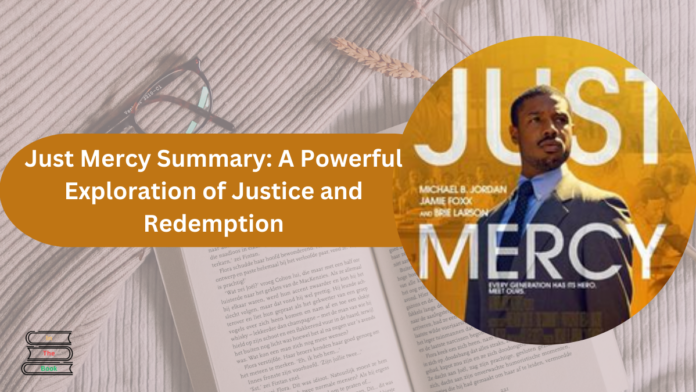Contents
- Introduction
- The Case of Walter McMillian
- Wrongful Conviction
- Systemic Flaws
- Bryan Stevenson’s Journey
- Early Career and Challenges
- Empathy and Compassion
- Critique of the Justice System
- Mass Incarceration
- Death Penalty
- Impact and Reception
- Critical Acclaim
- Film Adaptation
- The Call for Reform
- Policy Changes
- Personal Reflection
- Conclusion
Introduction
Just Mercy Summary, a book by Bryan Stevenson, is a thought-provoking narrative that delves into the author’s experiences as a young lawyer fighting for justice in a broken system. The Just Mercy summary tells the story of Walter McMillian, a black man wrongly accused of murdering a young white woman in Monroeville, Alabama, in the late 1980s. Through this narrative, Stevenson sheds light on the systemic flaws plaguing the American justice system, particularly race and poverty.
The Case of Walter McMillian
Wrongful Conviction
At the heart of the Just Mercy summary is the case of Walter McMillian. McMillian was arrested and convicted of the murder of Ronda Morrison despite a lack of evidence and multiple witnesses confirming his alibi. His conviction was a result of racial bias, a coerced testimony from a career criminal, and an inadequate defence. Stevenson takes on McMillian’s case as part of his work with the Equal Justice Initiative (EJI), determined to uncover the truth and fight for McMillian’s release.
Systemic Flaws
The Just Mercy summary highlights the systemic flaws in the justice system that led to McMillian’s wrongful conviction. These include racial prejudice, prosecutorial misconduct, and a judicial system that often prioritizes expediency over fairness. Stevenson’s investigation reveals a deeply flawed process that disregarded evidence and manipulated facts to ensure a conviction, illustrating the profound impact of systemic racism and injustice.
Bryan Stevenson’s Journey
Early Career and Challenges
The Just Mercy book recounts McMillian’s case and personal narrative of Bryan Stevenson’s journey as a lawyer. Stevenson, a graduate of Harvard Law School, founded the Equal Justice Initiative to provide legal representation to those most in need. Throughout the book, Stevenson shares his struggles and doubts and the lessons he learned from his clients and colleagues.
Empathy and Compassion
Stevenson argues that pursuing justice requires empathy, compassion, and understanding. He emphasizes seeing clients as individuals with complex lives and stories rather than mere case numbers. Through his clients’ stories, Stevenson shows the transformative power of Mercy and redemption in breaking cycles of violence and poverty.
Critique of the Justice System
Mass Incarceration
The Just Mercy summary critiques the United States’ obsession with incarceration, which has led to the country having the highest rate of imprisonment in the world. Stevenson highlights the flaws in the system that lead to wrongful convictions, including coerced confessions, false testimony, and inadequate legal representation. He argues that the justice system often fails to protect the most vulnerable, disproportionately impacting people of colour and people with low incomes.
Death Penalty
Much of the Just Mercy book focuses on the death penalty and its application. Stevenson presents compelling arguments against capital punishment, highlighting cases where innocent individuals were sentenced to death. He discusses the emotional and psychological toll on inmates, their families, and the families of victims. Stevenson advocates for a more humane approach to punishment, emphasizing rehabilitation over retribution.
Impact and Reception
Critical Acclaim
Just Mercy has received widespread critical acclaim for its thought-provoking narrative and insightful justice system analysis. Authors, activists, and public figures, including Michelle Alexander, Desmond Tutu, and John Legend, have praised the book. Stevenson’s ability to humanize his clients and present complex legal and ethical issues in an accessible manner has resonated with readers and critics alike.
Film Adaptation
The book’s impact was further amplified by its successful adaptation into a film starring Michael B. Jordan as Bryan Stevenson and Jamie Foxx as Walter McMillian. The film brought Stevenson’s message to a broader audience, sparking meaningful conversations about criminal justice reform and the need for systemic change.
The Call for Reform
Policy Changes
The Just Mercy summary has sparked meaningful conversations about criminal justice reform, with many calling for policy changes to address Stevenson’s issues. These include better legal representation for the accused, reforms to the death penalty, and measures to address racial bias in the justice system. Stevenson’s work with the EJI continues to advocate for these changes, striving to create a more just and equitable system.
Personal Reflection
Reading Just Mercy encourages personal reflection on one’s beliefs about justice, Mercy, and the legal system’s role. Stevenson’s stories challenge readers to confront their assumptions and consider the human impact of systemic flaws. The book is a powerful reminder that justice is not just a concept but a practice that requires empathy, compassion, and understanding.
Conclusion
Just Mercy is a powerful and moving book that challenges readers to confront the harsh realities of the American justice system. Through his narrative and the story of Walter McMillian, Bryan Stevenson makes a compelling case for Mercy, redemption, and justice. The Just Mercy book is a must-read for anyone interested in exploring the complexities of the justice system and the importance of fighting for human rights. Stevenson’s work serves as an inspiration to continue the fight for a fairer and more compassionate society.
Click Here To Read More

Ross, an exam specialist with a passion for education, writes comprehensive articles on exam results and admit cards. His expertise ensures students receive reliable information and useful tips to excel in their exams.



























